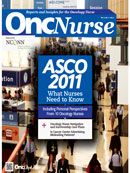Metformin May Decrease Diabetics' Breast Cancer Risk
In postmenopausal diabetic women, metformin use was associated with lower ER and PR breast cancer incidence.
In postmenopausal diabetic women, metformin use was associated with lower estrogen receptor—positive (ER ) and progesterone receptor–positive (PR ) breast cancer incidence, according to data presented at ASCO.
“Metformin is a biaguanide used in management of type 2 diabetes, in which it improves insulin resistance and may improve clinical outcomes,” said Rowan T. Chlebowski, MD, PhD, chief of Medical Oncology/Hematology at the David Geffen School of Medicine, University of California, Los Angeles, and lead author of the study. “Preliminary evidence suggests that metformin may decrease breast cancer risk by decreasing insulin levels and reducing cell proliferation.”
Metformin helps reduce low-density lipoprotein cholesterol and triglyceride levels, and is not associated with weight gain. As such, the drug is commonly used as a first-line treatment for type 2 diabetes, particularly among overweight and obese patients with normal kidney function.
Chlebowski and his fellow researchers measured associations between metformin use and breast cancer incidence by hormone receptor status in diabetic patients in the Women’s Health Initiative (WHI). The WHI is a multicomponent study designed to address determinants of major chronic disease in women.
The researchers’ cohort consisted of 156,229 postmenopausal women aged 50-79 years. A total of 9277 medication-treated cases of diabetes were identified in the cohort and followed for an average of 11.1 years (SD, 3.5 years). Information on drugs taken for diabetes was collected at baseline and after 3 years of follow-up. A subgroup of 2963 women were identified as being treated with metformin.
Nurses Perspective
Positive Metformin Effects Not Surprising
Mari Damhof, RN, OCN®
Oncology Nurse Navigator
Willmar Cancer Center, MN
Metformin, an affordable diabetes medication with a low risk of side effects, is now being considered for treatment in ER /PR breast cancer. The evidence that ER /PR breast cancer patients with lower insulin levels have improved outcomes arrives from a study presented at ASCO. The population group consisted of 156,229 postmenopausal women, of whom 2963 were women with diabetes treated with metformin.
Metformin works by decreasing the insulin level in the body. Another way to decrease insulin levels is with healthy eating, exercising, and maintaining a healthy weight, which also reduces the risk for breast cancer and recurrence. So it’s not totally surprising that metformin use is linked with decreased ER /PR breast cancer occurrence. Continued research is needed to determine when to potentially prescribe metformin, along with specific dosage details.
According to Chlebowski, there were major imbalances between the populations with and without diabetes.
“The diabetics were significantly older and were more likely to be African American, certainly less likely to be physically active than the cohort as a whole, and had a tremendous difference in body mass index [BMI]: 58.6% had a BMI greater than 30,” he said.
Among the entire study population, 8572 women had breast cancer, with 6994 cases of invasive breast cancer. Among women with diabetes, 502 had breast cancer, with 422 cases of invasive breast cancer. In the metformin subgroup, there were 174 patients with breast cancer.
On the basis of hormone receptor status, postmenopausal women with diabetes had a 15% lower incidence (hazard ratio [HR] = 0.85; 95% confidence interval [CI], 0.72-1.00; P =.04) of ER /PR breast cancer compared with women without diabetes. Additionally, women with diabetes taking metformin had a 38% lower risk for ER /PR breast cancer compared with diabetic women on other regimens (HR = 0.62; 95% CI, 0.44- 0.87; P = .02).
However, this relationship did not hold true for women with invasive breast cancer or for women with ER-/PR , ER-/PR- breast cancer. Breast cancer incidence was also not observed to be lower with triple-negative status, HER2 status, and tumor size and stage, according to Chlebowski.
In discussing these data, Pamela J. Goodwin, MD, of Mount Sinai Hospital and Princess Margaret Hospital in Toronto, Canada, noted that there have been a number of observational studies of metformin and breast cancer risk, although none have reported details of breast cancer characteristics.
“Energy balance, as reflected by obesity, diabetes, and its treatment are important endogenous ‘host’ factors that may influence cancer risk and progression,” she stated. “I think as we study these associations, it’s important to be aware of a time course of hyperinsulinemia, hypoglycemia, and diabetes. The potential reversibility of these factors suggests key approaches to cancer prevention.” Abstract 1503

Nurse Practitioners Weigh in on Data From the San Antonio Breast Cancer Symposium
January 16th 2023Loyda Braithwaite, MSN, RN, AGPCNP-BC, AOCNP; and Jamie Carroll, APRN, CNP, MSN, highlight presentations from the 2022 San Antonio Breast Cancer Symposium that will influence oncology nursing practice.


